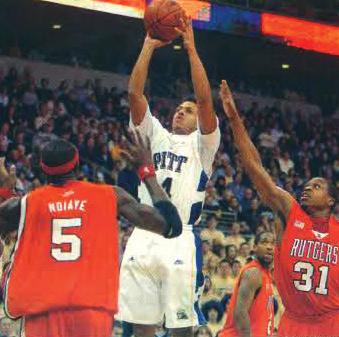Pittsburgh remains home for former Panthers

July 15, 2014
After Ronald Ramon finished his first season as a pro basketball player, he knew where he wanted to spend his offseason.
The former Panther men’s basketball player from the Bronx, N.Y., who graduated in 2008, came back to Pitt after finishing his first season with his team in Argentina and spent the summer of 2009 working out on campus with old teammates and using the facilities just as he did when he was a student.
“This was home,” Ramon said.
Now, years later, it’s become an annual routine.
Pittsburgh serves as a summer home base to Ramon and his family. He closed on a house on Tuesday and has had an apartment here since 2010.
“I never really left,” Ramon, who currently plays in Brazil, said.
Ramon, John DeGroat and Chevon Troutman make up a small group of former Pitt players, all current pros, who return to Oakland every summer in between their pro seasons, which can run six-eight months, depending on how a team does.
DeGroat, a fellow New Yorker and college teammate, who now plays in Argentina, comes back every summer to work out at the Petersen Events Center and compete in the Pittsburgh Basketball Club Pro-Am as a member of the South Hills Audi-sponsored team with former Pitt player Chevy Troutman.
“We all look forward to it. The seasons can be so long sometimes; we all look forward to being here together, relaxing [and] just enjoying each other’s friendship,” DeGroat, who lives in an apartment when he’s here, said.
DeGroat said when they get together, the pro players go to the gym, play basketball and sometimes go to Sandcastle Waterpark in Homestead.
Troutman, a Williamsport, Pa. native, has come back every summer since he finished his studies at Pitt in 2005. He also has a house in the area to which he returns for the summers after playing in Europe, most recently in Germany. His mother and young son live in Pittsburgh now, and his father lives close by.
According to Troutman, not all former players feel as comfortable returning to Pitt as he does, whether it’s for a little or a long time.
“A lot of the guys seem a little bit intimidated coming back because you’re supposed to move to the next part [of your life],” he said. “But you can still move to the next part and still come back and show your face, because you were a part of building this program.”
Troutman understands the uncertainty, though.
“Once you leave the college program, you kind of get out of it, especially if you become a pro, because then it’s kind of weird for you to come back,” Troutman said. “Sometimes guys don’t know who you are.”
The trio credits the men’s basketball staff and its foundation of long-time employees for establishing and maintaining an environment where former players don’t feel like hindrances when they return after their time in the uniform has ended.
“People are so happy to see these guys,” Troutman said.
He said his first day back at Pitt usually involves catching up with people on campus.
Troutman, DeGroat and Ramon’s roles within the basketball team during the summer have changed now that their former teammates have also finished their collegiate careers. Now, the veteran players are mentors to the current players.
“If we see them doing something that’s not right on the court, we feel like it’s our job to correct it, which is kind of funny. It’s like a big brother type of thing,” Ramon said. “We always watch and make sure that they’re all right and everything is going well with them.”
DeGroat said the bond he’s formed with the current team is similar to the relationships he had with his former teammates because everyone shares the same passion.
“That’s all a part of brotherhood because, at the end of the day, every man in that locker room loves this game of basketball,” he said.
The summers in Oakland also help prepare the players for their professional lives.
Troutman said playing in the Pro-Am, which he started doing two years ago, is a good way to stay in shape for the upcoming season and work on his game. It also gives him an opportunity to show the current players that he can still run with them.
“They see me on the court, and they can see that I can play,” he said. “They can’t be like, ‘Oh, this old guy.’ I come back and give them a little taste of what the pro game is like.”
For the players, building relationships with prior athletes is a longtime tradition.
DeGroat first met Ricardo Greer, a Pitt player who left in 2001, the summer before his junior year in 2004 and recalled spending time with him, playing basketball, getting food and just hanging out.
While they’ve stayed in touch via email and phone over the years, this summer was the first time the two had seen each other since then. Greer was back in Pittsburgh for the first summer session to finish up his degree.
“When he came back,” DeGroat said, “it was like we never lost touch.”







